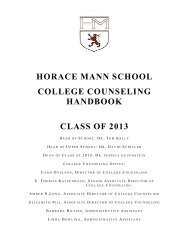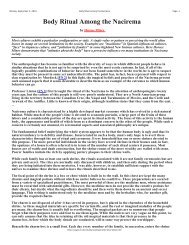horace mann school's publication for gender issues
horace mann school's publication for gender issues
horace mann school's publication for gender issues
You also want an ePaper? Increase the reach of your titles
YUMPU automatically turns print PDFs into web optimized ePapers that Google loves.
<strong>horace</strong> international domestic <strong>mann</strong> arts<br />
strangulation by Alex Perry<br />
Simply put, under normal circumstances,<br />
causing another person physical harm is not<br />
only unethical, but also punishable by law.<br />
Specific criteria exist to determine whether<br />
a person’s conduct is legal. For example,<br />
the law defines assault as an intentional<br />
threat to cause bodily injury to another by<br />
<strong>for</strong>ce under circumstances that cause the<br />
other person to have well-founded fear of<br />
imminent peril. An important distinction<br />
that must be made when referring to<br />
assault is the existence of contact. A charge<br />
of assault can be made even if the threat<br />
of harm is not completed. To put this<br />
jean mariano<br />
definition in perspective, a person that<br />
pulls out a fake gun that looks real may be<br />
liable <strong>for</strong> assault, even though there was<br />
never any intention of a shot being fired.<br />
The threat is what constitutes assault, not<br />
the actual fulfillment of the threat. The<br />
legal definition of battery is the intentional<br />
touching of a person against that person’s<br />
will; whether injury occurs as a result is not<br />
pertinent. An extreme example of battery<br />
can be a situation in which somebody spits<br />
on another person. Even though this is in<br />
no way life threatening, a charge of a battery<br />
has still been committed. While keeping<br />
these definitions of illegal actions in mind,<br />
it should be very surprising to anybody that<br />
it was not until recently that the intentional<br />
strangling of a person was determined<br />
to be illegal in the state of New York. On<br />
June 7 th , 2010, New York State passed the<br />
anti-strangulation bill, sponsored by State<br />
Senator Eric Schneiderman and Assembly<br />
members Joseph Lenton and Helene<br />
Weinstein.<br />
Strangulation is an action that can be<br />
considered somewhat common in domestic<br />
violence and sex crime cases. The original<br />
reasoning <strong>for</strong> the lack of punishment<br />
after strangulation is that this act does<br />
not always leave visible signs of injury. In<br />
reality, the lack of physical signs should be<br />
disregarded when considering whether or<br />
not strangulation is an illegal act. Strangling<br />
can be more dangerous than punching, and<br />
death by strangulation can occur in only<br />
a few minutes. The anti-strangulation bill<br />
urged the state of New York to make this<br />
“terrifying and life-threatening” abuse<br />
illicit and put the perpetrator under the<br />
jurisdiction of the law.<br />
The way the law handles (or does not<br />
handle) strangling has had a negative effect<br />
on adolescents. It has become increasingly<br />
aware to doctors that teenagers are playing<br />
a very dangerous game that involves<br />
choking themselves almost to the point<br />
of unconsciousness in an attempt to get<br />
high. A recent article published in the<br />
New York Times focused on a 16 year old<br />
that had killed himself using a homemade<br />
noose trying to play this game. Although<br />
obviously not the only way to play, there<br />
have been instances of participants choking<br />
each other as a method to play this absurd<br />
game. Videos showing how to play this<br />
game have shown up on Myspace; some are<br />
considered “instructional” videos, while<br />
others are just examples of kids playing this<br />
game. The teenagers playing this game are<br />
obviously not taking the risks associated<br />
with it seriously enough, although it seems<br />
as though the law is not either. If the law<br />
does not determine the strangling of a<br />
person a crime, why should these people<br />
view their game as more dangerous than<br />
engaging in illicit drug use<br />
9

















